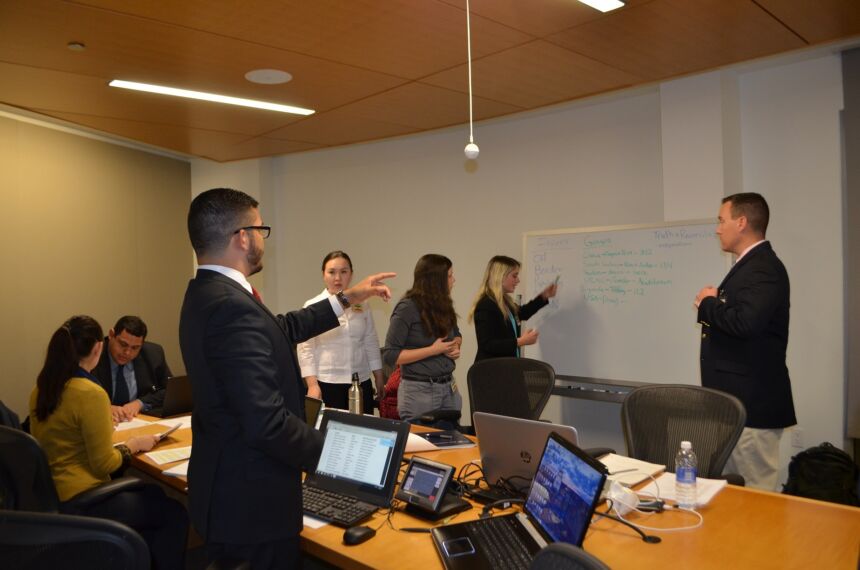November 04, 2015
Former U.S. special envoy guides students as they get hands-on experience in crisis negotiation

University Park, Pa. - “Sudan and South Sudan need a comprehensive peace agreement,” said retired U.S. Ambassador Princeton Lyman. “The unrest in the region is affecting the surrounding regions with issues of development, human rights violations and refugees running in every direction.”
With this statement, the Penn State School of International Affairs transformed into the United Nations for the U.S. Army War College International Strategic Crisis Negotiation Exercise, which took place on Oct. 23 and 24 at the Lewis Katz Building. Lyman who played the part of the U.N. special representative in this simulation exercise was the special envoy for Sudan and South Sudan from March 2011 to March 2013 and led U.S. policy in the implementation of the 2005 Comprehensive Peace Agreement.
The Simulation
The International Strategic Crisis Negotiation Exercise was created by the U.S. Army War College to train high-level international military officers, but it was adapted for universities about 10 years ago. It’s designed to give hands-on experience, negotiation strategizing, and diplomacy skills to those who may someday have the task of resolving real-world conflicts. Students began negotiating at 4 p.m. on Friday and concluded at 2 p.m. on Saturday.
While the exercise was largely student driven, Lyman, SIA faculty members, and Army War College personnel were on hand to lend guidance drawn from their own career experience.
The scenario is set 10 years into the future, when agreements between Sudan and South Sudan have broken down. Student negotiating teams represented China, Ethiopia, South Sudan, Sudan, Sudanese Peoples Liberation Movement of the North (SPLMN), Uganda, and the United States in a setting similar to a U.N. summit. U.S. Army Col. Dallis Barnes, one of the organizers from the U.S. Army War College stressed the time management aspects of the process and reminded students that “this is a diplomatic process and a long-term process, so the problem will not be solved. Everyone is not going to win or lose, but strive for progress,” he said.
Lessons Learned
“It’s an intense, challenging, and useful experience,” said Jeffrey Morgan who is in his first year at SIA focusing on international security studies and played the part of a diplomatic representative from Sudan. “It’s about staying true to your country’s objectives, but making progress during specified time constraints.”
In addition to the 55 first-year SIA students who represented seven countries, 14 second-year SIA students served in an adviser and mentor capacity for each country team of representatives. First-year student Karen Coker, who represented the SPLMN, said she learned a lesson in communications and trust between many different entities.
“We’ll negotiate with one country’s representatives who tell us one thing, and those representatives will negotiate with another country and say something else,” she said. “Then there is certain information some country representatives know, and others don’t, so as negotiators we have to navigate through all sorts of information.”
Country team representatives spent time in their own negotiation rooms discussing their objectives, prioritizing, and reviewing what issues to leverage in their negotiations, and in meetings other countries, sometimes one to one and sometimes with a few nations in each meeting. The weighty issues of oil and humanitarian aid took precedence within the team discussions of China, South Sudan, and Sudan. Students were struck by the complexity of the process, and how nations have interconnected objectives that affect other nations when negotiating, as well as how basic human traits came into play during negotiations.
“Sometimes it was even difficult to present our own objectives as a unified country, just based on the personalities within our own delegation,” said Tiffany Louk, a first-year student representing Ethiopia. “This is aside from the personalities we encounter when negotiating with other country representatives.”
SIA professor and retired U.S. Ambassador Dennis Jett schedules the exercise every year with the Army War College so students gain hands-on experience in international diplomacy, negotiation techniques, and strategic and national-level decision making.
